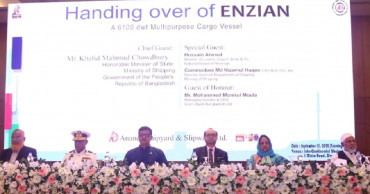ship
‘If money is not given, they will kill us’: Audio message of hijacked ship’s chief officer
Mina Azmin, wife of Mohammad Atique Ullah Khan, chief officer of the Bangladeshi ship MV Abdullah that was hijacked by Somali pirates, had to be admitted to a hospital after fainting repeatedly.
Atique sent an audio message to his wife around iftar time on Tuesday (March 12, 2024).
Atique’s audio message said, “They are taking our mobile phones away. The bottom line is, if the money is not given, they will kill us one by one. The sooner the money is given, the sooner they will let us go. Please, get this message out.”
Atique is from Chandanaish upazila of Chattogram. He lives in the Nandan Kanan area of the port city with his mother, wife and three daughters.
His elderly mother Shahnoor Begum and children broke down in tears when this correspondent went to their home last night. Shahnoor Begum was crying and hugging a framed picture of Atique.
Govt in touch with international bodies to rescue hijacked Bangladeshi ship, its crew: FM
"A day feels like a year! I was told that we’ll have to wait a few months to get our son back. How will I live with this sorrow?" — Shahnoor Begum wailed.
With her son held hostage by Somali pirates and daughter-in-law unwell, Shahnoor Begum was visibly worried. She said, "In his last voice message, my son told my daughter-in-law, ‘If they don't give the money, they will kill us.' She has been ill ever since she got that message.
“She is expecting. After losing consciousness several times on Tuesday night, we took her to a private hospital. After treatment, we brought her home. She is still ill!
“My son Atique took the responsibility of the whole family. He has been working on the ship since 2007. Now he is in terrible danger! I don't know how my son is, if he has food to eat.
“We were sitting down to have Iftar on the first day of Ramadan. I just put a date in my mouth; at that time the phone rang. My son said that Somali pirates had attacked their ship. The ship is now under their control.”
Please pray, says hijacked ship Abdullah's chief engineer to his family
1 year ago
Indian Naval ship INS Kiltan arrives at Chattogram
Indian Naval Ship, INS Kiltan arrived at Chattogram on Monday on a three-day goodwill visit as part of the ongoing close cooperation between the Navies of Bangladesh and India.
The ship was given a warm welcome by the Bangladesh Navy.
Naval cooperation between Bangladesh and India is an important pillar of the bilateral defence cooperation, said the Indian High Commission in Dhaka.
Also Read: Chandpur to get 300-ft modern naval port in World Bank-backed project
Regular exchange of ship visits has played an important role in strengthening mutual trust and understanding between the two Navies, it said.
INS Kiltan is the third ship of P 28 class Anti-Submarine Warfare (ASW) corvettes, indigenously built by Garden Reach Shipbuilders & Engineers (GRSE), Kolkata.
Also Read: Chinese navy ship pays port call to Philippines in goodwill tour of region
2 years ago
26,620 mts of coal for Rampal Power plant arrives at Mongla
A ship carrying 26,620 mts of coal for the Rampal Thermal Power Plant in Bagerhat arrived here from Indonesia.
Chinese flag-carrying ‘MV Zhe Hai-526’ship arrived here at Harbaria of the Mongla port early Saturday (June 10, 2023).
Also Read: Rampal electricity cost nearly doubles due to high coal price, increased dollar rate
The unloading of the coal from the vessel started around 9:40 am and it is being deposited to the jetty of Rampal Power Plant through a lighterage vessel.
Assistant manager of Shipping Agent Togi Shipping and Logistic Ltd, Khulna, Khandaker Riazul Haque, said the ship carrying the coal left for Mongla on May 27 and anchored at Harbaria-11 in Pashur Channel around 5 am.
Also Read: Dollar crisis casts a shadow over operation of Rampal coal-fired power plant
The coal will be taken to a coal shed through an automated belt, said Riazul.
On May 16, a total of 30,000 metric tonnes and 30,500 metric tonnes of coal arrived at Mongla port by MV Bashundhara Impress and MV Basundhara Majesty, on May 16 and May 29, respectively.
Also Read: Transmission from Adani’s Gadda power plant to national grid resumes
2 years ago
Ukrainian grain shipments drop as ship backups grow
The amount of grain leaving Ukraine has dropped even as a U.N.-brokered deal works to keep food flowing to developing nations, with inspections of ships falling to half what they were four months ago and a backlog of vessels growing as Russia's invasion nears the one-year mark.
Ukrainian and some U.S. officials are blaming Russia for slowing down inspections, which Moscow has denied. Less wheat, barley and other grain getting out of Ukraine, dubbed the “breadbasket of the world, ” raises concerns about the impact to those going hungry in Africa, the Middle East and parts of Asia — places that rely on affordable food supplies from the Black Sea region.
The hurdles come as separate agreements brokered last summer by Turkey and the U.N. to keep supplies moving from the warring nations and reduce soaring food prices are up for renewal next month. Russia is also a top global supplier of wheat, other grain, sunflower oil and fertilizer, and officials have complained about the holdup in shipping the nutrients critical to crops.
Under the deal, food exports from three Ukrainian ports have dropped from 3.7 million metric tons in December to 3 million in January, according to the Joint Coordination Center in Istanbul. That's where inspection teams from Russia, Ukraine, the U.N. and Turkey ensure ships carry only agricultural products and no weapons.
The drop in supply equates to about a month of food consumption for Kenya and Somalia combined. It follows average inspections per day slowing to 5.7 last month and 6 so far this month, down from the peak of 10.6 in October.
Also Read: Russia’s year of war: Purge of critics, surge of nationalism
That has helped lead to backups in the number of vessels waiting in the waters off Turkey to either be checked or join the Black Sea Grain Initiative. There are 152 ships in line, the JCC said, a 50% increase from January.
This month, vessels are waiting an average of 28 days between applying to participate and being inspected, said Ruslan Sakhautdinov, head of Ukraine's delegation to the JCC. That's a week longer than in January.
Factors like poor weather hindering inspectors’ work, demand from shippers to join the initiative, port activity and capacity of vessels also affect shipments.
“I think it will grow to be a problem if the inspections continue to be this slow,” said William Osnato, a senior research analyst at agriculture data and analytics firm Gro Intelligence. “In a month or two, you’ll realize that’s a couple a million tons that didn’t come out because it’s just going too slowly.”
“By creating the bottleneck, you’re creating sort of this gap of the flow, but as long as they’re getting some out, it’s not a total disaster,” he added.
U.S. officials such as USAID Administrator Samantha Power and U.S. Ambassador to the U.N. Linda Thomas-Greenfield have blamed Russia for the slowdown, saying food supplies to vulnerable nations are being delayed.
Ukrainian Foreign Minister Dmytro Kuleba and Infrastructure Minister Oleksandr Kubrakov said in statement Wednesday on Facebook that Russian inspectors have been “systematically delaying the inspection of vessels” for months.
They accused Moscow of obstructing work under the deal and then “taking advantage of the opportunity of uninterrupted trade shipping from Russian Black Sea ports.”
Osnato also raised the possibility that Russia might be slowing inspections “in order to pick up more business” after harvesting a large wheat crop. Figures from financial data provider Refinitiv show that Russian wheat exports more than doubled to 3.8 million tons last month from January 2022, before the invasion.
Russian wheat shipments were at or near record highs in November, December and January, increasing 24% over the same three months a year earlier, according to Refinitiv. It estimated Russia would export 44 million tons of wheat in 2022-2023.
Alexander Pchelyakov, a spokesman for the Russian diplomatic mission to U.N. institutions in Geneva, said last month that the allegations of deliberate slowdowns are “simply not true.”
Russian officials also have complained that the country's fertilizer is not being exported under the agreement, leaving renewal of the four-month deal that expires March 18 in question.
Without tangible results, extending the deal is “unreasonable,” Deputy Foreign Minister Sergey Vershinin on Monday told RTVI, a privately owned Russian-language TV channel.
U.N. officials say they have been working to unstick Russian fertilizer and expressed hope that the deal will be extended.
“I think we are in slightly more difficult territory at the moment, but the fact is, I think this will be conclusive and persuasive,” Martin Griffiths, U.N. undersecretary-general for humanitarian affairs, told reporters Wednesday. “The global south and international food security needs that operation to continue.”
Tolulope Phillips, a bakery manager in Lagos, Nigeria, has seen the impact firsthand. He says the cost of flour has exploded 136% since the war in Ukraine began. Nigeria, a top importer of Russian wheat, has seen costs for bread and other food surge.
“This is usually unstable for any business to survive,” Phillips said. “You have to fix your prices to accommodate this increase, and this doesn’t only affect flour — it affects sugar, it affects flavors, it affects the price of diesel, it affects the price of electricity. So, the cost of production has generally gone up.”
Global food prices, including for wheat, have dropped back to levels seen before the war in Ukraine after reaching record highs in 2022. In emerging economies that rely on imported food, like Nigeria, weakening currencies are keeping prices high because they are paying in dollars, Osnato said.
Plus, droughts that have affected crops from the Americas to the Middle East meant food was already expensive before Russia invaded Ukraine and exacerbated the food crisis, Osnato said.
Prices will likely stay high for more than a year, he said. What's needed now is “good weather and a couple of crop seasons to become more comfortable with global supplies across a number of different grains” and “see a significant decline in food prices globally.”
3 years ago
Bangladesh exports its “largest ever” container ship to UK
Bangladesh today (September 13, 2022) exported a locally built 6100-ton load capacity high-speed multipurpose container ship to the UK.
This is the largest container ship built in the country that has been exported, according to the ship’s builder.
Ananda Shipyard, a Bangladeshi shipbuilding company, has built the ship as per the requirements of UK-based Enzian Shipping Company Ltd.
Read:Foreign investors urged to expand businesses in Bangladesh
The vessel was officially handed over today through a ceremony held at InterContinental Dhaka. State Minister for Shipping Khalid Mahmud Chowdhury was present as the chief guest at the function.
The National Board of Revenue’s Member (Customs Policy) Hossain Ahmed; Director General of Shipping Directorate, Commodore Nizamul Haque; Islami Bank Managing Director and CEO Monirul Mawla; Chairman of Ananda Shipyard, Dr Abdullahel Bari, and Managing Director Afroza Bari also spoke in the function.
3 years ago
8-metre draught vessel docks at Mongla for first time
A container ship with an 8-metre draught, the first of its size, docked at Mongla port Monday.
The 186-metre long MCC Tokyo arrived from China's Shanghai. It moored at jetty No. 5 of the port with 289 containers, carrying goods weighing 7,241 metric tonnes, at 2:15pm, the Mongla Port Authority said.
The unloading of the consignment from the ship started at 3:30pm.
"The ship will leave the port after reloading goods. It was a trial run showing that ships with 8-metre draughts can also anchor at the port," Syed Zahid Hossain, local shipping agent of MCC Tokyo and managing director of Sun Trade, said.
The ship will leave the port for China Wednesday after reloading goods.
"MV Tokyo was the first ship of its size to anchor at Mongla port. It has been possible due to dredging. Previously all the ships that anchored at the jetties did not have a draught of more than seven metres," Zahid said.
Also read: Fourth Russian shipment for Rooppur arrives at Mongla Port
3 years ago
Ship carrying grain from Ukraine arrives in Istanbul
The first of the ships to leave Ukraine under a deal to unblock grain supplies and stave off a potential global food crisis arrived at its destination in Turkey on Monday.
The Turkey-flagged Polarnet docked at Derince port in the Gulf of Izmit after setting off from Chornomorsk on Aug. 5 laden with 12,000 tons of corn.
“This sends a message of hope to every family in the Middle East, Africa, and Asia: Ukraine won’t abandon you,” Ukrainian Foreign Minister Dmytro Kuleba tweeted. “If Russia sticks to its obligations, the ‘grain corridor’ will keep maintaining global food security.”
Read: UN food price index dropped in July for fourth month
A total of 12 ships have now been authorized to sail under the grain deal between Ukraine and Russia, which was brokered by Turkey and the United Nations — ten outbound and two headed for Ukraine. Some 322,000 tons of agricultural products have left Ukrainian ports, the bulk of it corn but also sunflower oil and soya.
3 years ago
Tourist ships return to St Martin's island
Tourist ships started travelling to St. Martin's island from Cox's Bazar on Tuesday.
After a seven-month break the Kerry Cruise and Dine with 310 tourists left Damdamia of Teknaf at 9 am and arrived at St. Martin's dock around 12.30 pm.
As soon as they reached the island, locals greeted the tourists with flowers led by St. Martin’s Union Parishad Chairman Nur Ahmed.
Teknaf Upazila Nirbahi Officer (UNO) Parvez Chowdhury said that at the beginning of the season, the Kerry Cruise and Dine Ship Authority had been given permission to operate the St. Martin's-Teknaf route on a trial basis. On the first day, 310 passengers reached the island.
He added that the island's jetty has been renovated to make it easier for tourists to get on and off. Within a day or two, other ships in this route may also start operating subject to permission.
Tabassum Jannat, a student at Sylhet Shahjalal University of Science and Technology, said: "It feels so good to be here, everyone will enjoy the beauty of the coral island again."
The hotels and motels on the island have already been set up for tourists. Businessmen involved in the tourism industry have prepared themselves to serve tourists. Besides, the islanders who depend on tourists for their livelihood are now breathing a sigh of relief.
Nur Ahmed, chairman of the St. Martin's Union Council, said, “Businessmen and locals have already been requested to provide maximum service and hospitality to the tourists. Moreover, care will be taken to ensure that tourists are not harassed anywhere.”
Shah Alam, Teknaf's manager for the cruise ship Kerry Cruise and Dine, said excessive capacity of passengers is not being carried as per the instructions of the concerned authorities and extra ticket price is not being charged from the passengers. "We want tourists to come to the island, to give the tourism industry a chance to develop further through travelling. We expect more tourists to visit the island this year than any other," he added.
4 years ago
Transport strike disrupting goods delivery from Ctg port
The nationwide transport strike, enforced by transporters against fuel price hike, is seriously disrupting the movement of inbound and outbound goods-laden vehicles of Chattogram port, bringing goods delivery almost to a halt.
No vehicle has been seen entering the port for carrying the unloaded goods or leaving it since the early hours of Friday, said sources at the country’s largest port.
The port authority, however, said loading and unloading of containers and goods from vessels are normal at the jetty.
Bus, truck and van owners went on an indefinite strike from Friday in protest against fuel price hike.
Also read: Strike to continue as transporters’ meeting with minister ends ‘inconclusively’
Port secretary Md Omar Faruque said, “All the activities inside the port are normal. If the strike continues for a longer period, it’ll affect its activities for sure.”
4 years ago
British navy group: ‘Potential hijack’ of ship off UAE coast
The British navy warned Tuesday of a “potential hijack” of a ship off the coast of the United Arab Emirates in the Gulf of Oman, without elaborating.
The British military’s United Kingdom Maritime Trade Operations initially warned ships Tuesday that “an incident is currently underway” off the coast of Fujairah. Hours later, they said the incident was a “potential hijack.” They did not elaborate.
The U.S. military’s Mideast-based 5th Fleet and the British Defense Ministry did not immediately return calls for comment. The Emirati government did not immediately acknowledge the incident.
Also read: India to maintain warships in Gulf zone to aid merchant ship
Earlier, four oil tankers announced around the same time via their Automatic Identification System trackers that they were “not under command,” according to MarineTraffic.com. That typically means a vessel has lost power and can no longer steer.
An Oman Royal Air Force Airbus C-295MPA, a maritime patrol aircraft, was flying over the area where the ships were, according to data from FlightRadar24.com.
The event comes just days after a drone struck an oil tanker linked to an Israeli billionaire off the coast of Oman, killing two crew members. The West blamed Iran for the attack, which marked the first known assault to have killed civilians in the yearslong shadow war targeting commercial vessels in the region.
Iran denied playing any role in the incident, though Tehran and its allied militias have used similar “suicide” drones in attacks previously.
Also read: Data recovered as ship with chemicals sinking off Sri Lanka
Israel, the United States and United Kingdom vowed a “collective response” to the attack, without elaborating.
4 years ago







.jpg)
.jpg)
.jpg)






